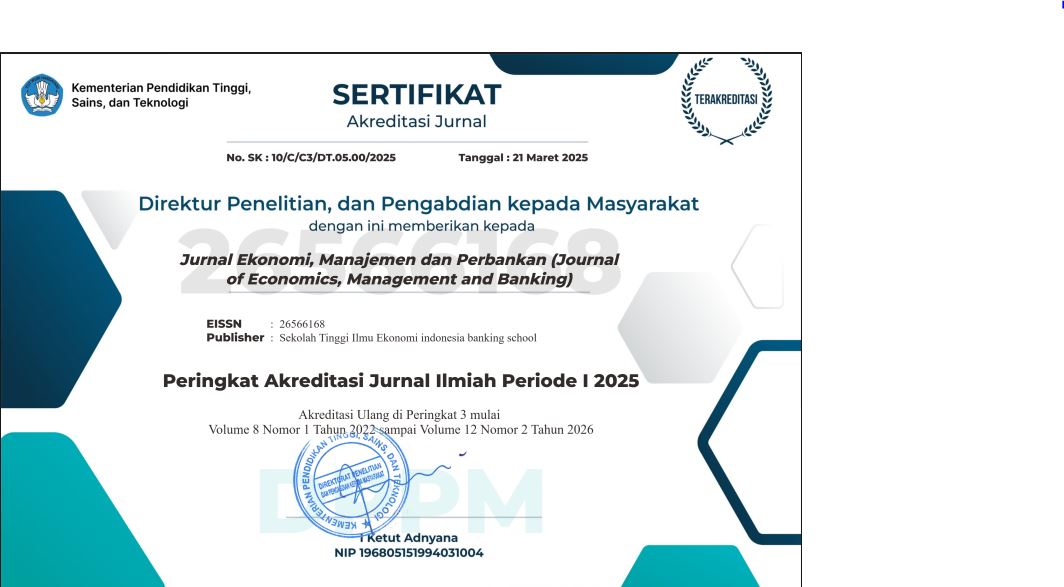Pengaruh Perceive Organizational Support dan Core Self Evaluation terhadap Job Per-formance Melalui Job Engagement dan Organizational Citizenship Behavior (Studi pa-da: Karyawan Tetap PT. Anomali Coffee Indonesia)
DOI:
https://doi.org/10.35384/jemp.v5i1.168Keywords:
Perceive Organizational, Core Self Evaluation, Job Engagement, Organizational Citizenship Behavior, Job PerformanceAbstract
Indonesia as the largest coffee producer in the world, but Indonesia citizens prefer to consume coffee from other countries rather than Indonesia coffee. The purpose of this study is to know the influence of per-ceived organizational support and core self-evaluation on job performance through job engagement and organizational citizenship behaviour. This research is categorized as survey research with descriptive analysis method by taking a sample and using a questionnaire as the main data. The sample has been col-lect 142 employees from 250 employees of PT. Anomali Coffee Indonesia. The respondents are chosen by using non-probability sampling and convenience sampling techniques. The results of the analysis using Structural Equation Modeling (SEM) and its result would be summarized as below: 1). Perceive Organiza-tional has positive and significant Job Engagement 2). Core Self Evaluation has positive and significant to Job Engagement 3). Job Engagement has positive and significant to Organizational Citizenship Behavior 4). Organizational Citizenship Behavior has positive and significant to Job Performance.References
Al-mahasneh, M. A. (2015). The impact of Organi-zational Citizenship Behavior on Job Perfor-mance at Greater Amman Municipality, 7(36), 108–118.
Bono, J. E., & Judge, T. A. (2003). Core Self-Evaluations : A Review of the Trait and its Role in Job Satisfaction and Job Perfor-mance, 18(July 2002), 5–18.
Dalal, R. S. (2005). A Meta-Analysis of the Rela-tionship Between Organizational Citizenship Behavior and Counterproductive Work Be-havior. A Meta-Analysis of the Relationship Between Organizational Citizenship Behavior and Counterproductive Work Behavior, 90(6), 1241–1255. https://doi.org/10.1037/0021-9010.90.6.1241
Erez, A., & Judge, T. A. (2001). Relationship of Core Self-Evaluations to Goal Setting , Moti-vation , and Performance, 86(6), 1270–1279. https://doi.org/10.1037//0021-9010.86.6.1270
Hair, J. F., Black, Babin, & Anderson. (2010). Mul-tivariate Data Analysis. Pearson. Hurst, T. A. (2007). Capitalizing on One’s Advantages: Role of Core Self-Evaluations
Ivan A. Setiawan. (2012). Hubungan Antara Per-ceived Organizational Support Dan Job In-volvement Dengan, IV(1), 1–14.
Joseph, J., Brian, H. C., & Shawn, F. (2017). Arti-cle information :
Judge, Timothy AErez, A. (2003). The Core Self Evaluations Scale: Development of Measure, 303–331.
Judge, T. A., & Hurst, C. (2007). Capitalizing on One ’ s Advantages : Role of Core Self-Evaluations, 92(5), 1212–1227. https://doi.org/10.1037/0021-9010.92.5.1212
Malhotra, N. K. (2005). Riset Pemasaran Pendeka-tan Terapan (4th Jilidl). Jakarta: PT. Indeks Kelompok.
Malhotra, N. K. (2010). Marketing Research: An Applied Orientation. Upper Saddle: Pearson/Prentice Hal.
Michael armstrong 10th edition. (n.d.). Human re-source management practice.
Rich, B. L., Lepine, J. a, & Crawford, E. R. (2010). Job Engagement: antecents and effects on job performance. Academy of Management Jour-nal, 53(3), 617–635. https://doi.org/10.5465/amj.2010.51468988
Robertson-smith, G., & Markwick, C. (2009). Em-ployee Engagement A review of current thinking. Saks, A. M. (2006). Antecedents and consequences of employee engagement. https://doi.org/10.1108/02683940610690169
Santoso, S. (2012). Analisis SEM Menggunakan AMOS. Jakarta: PT. Elex Media Komputindo.
Sekaran, U., & Bougie, R. (2013). Research Meth-ods for Business (6th ed.). United Kingdom: John Wiley & Sons Ltd.
Seonghee Cho & Misty M.Johanson. (2008). Jour-nal of Hospitality & Tourism Research. https://doi.org/10.1177/1096348008317390
Setyani, D. (2006). Pengaruh job involvement ter-hadap job performance dan organizational citizenship behavior pada karyawan pt. wa-hana lentera raya gresik, (1976).
Shanock, L. R., & Eisenberger, R. (2006). When Supervisors Feel Supported: Relationships With Subordinates ’Perceived Supervisor Support , Perceived Organizational Support , and Performance, 91(3), 689–695. https://doi.org/10.1037/0021-9010.91.3.689
Wijanto, S. H. (2008). Structural Equation Model-ing dengan LISREL 8.8 (1th ed.). Yogyakar-ta: Graha Ilmu.
William H. Turnley, Mark C. Bolino, S. W. L. & J. M. B. (2003). The Impact Of Psychological Contract Fulfillment on the Performance of In Role and Organizational Citizenship Be-haviors.
Zhong, L., Wayne, S. J., & Liden, R. C. (2015). Job engagement , perceived organizational sup-port , high-performance human resource practices , and cultural value orientations : A cross-level investigation, (59). https://doi.org/10.1002/job
Ziyae, B. (2016). Article information : Presenting an Evaluation Model of Human Resource Management’s Effect on Corporate Entrepre-neurshipIntroduction.
http://www.aeki-aice.org diakses 27 desember 2017
https://swa.co.id diakses 7 Januari 2018
Downloads
Published
Issue
Section
License
Authors who publish with this journal agree to the following terms:
- Authors retain copyright and grant the journal right of first publication with the work simultaneously licensed under a Creative Commons Attribution License that allows others to share the work to acknowledge the work's authorship and initial publication in this journal.
- Authors can enter into separate, additional contractual arrangements for the non-exclusive distribution of the journal's published version of the work (e.g., post it to an institutional repository or publish it in a book) with an acknowledgment of its initial publication in this journal.
- Authors are permitted and encouraged to post their work online (e.g., in institutional repositories or on their website) before and during submission. It can lead to productive exchanges and earlier and greater citation of published work.















